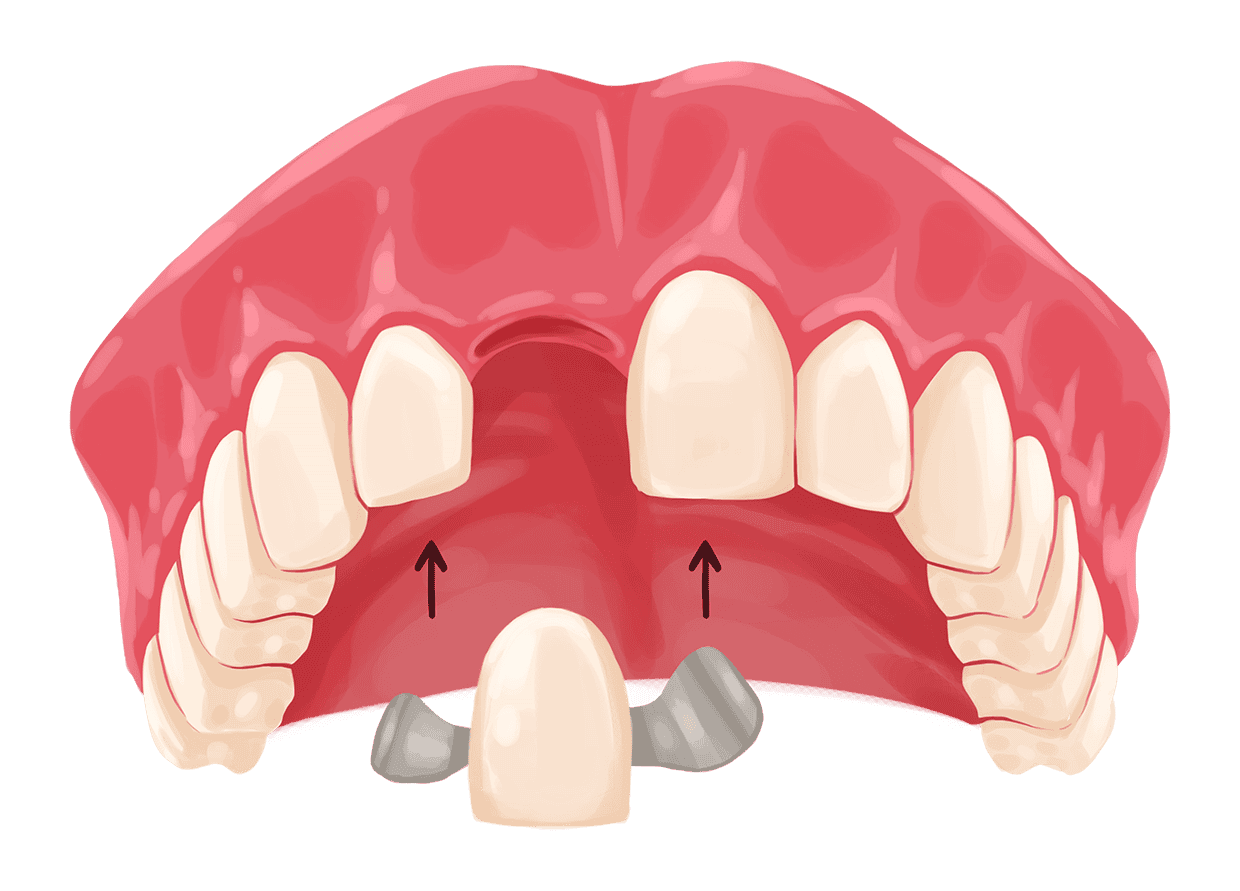If you’re looking into getting a dental bridge, you may already know about all the different kinds. Whether you do or not, this article will take you through an overview of each, their pros and cons, and what they cost.
Ready to learn about the types of dental bridges available?
So which bridge will you cross?
1 – Traditional dental bridge

A traditional dental bridge is the most common type of bridge people get. They have as few as one tooth and attach to the prosthesis. The whole contraption attaches to your surrounding natural teeth via abutments, which are cemented to the natural teeth.
So if you have natural teeth on both sides of the gap that needs a fake tooth, you can get a traditional bridge.
A traditional bridge usually costs between $2,000 and $5,000, which includes the prosthesis with a crown per abutment tooth.
- Very popular and reliable dental prosthesis
- Works well in most patient cases
- Comparatively affordable
- The dentist will need to remove the enamel of the supporting teeth to place the crowns over top of them
- The removed enamel will never grow back, so once you get a traditional bridge, you’ll always have to have a bridge
2 – Cantilever dental bridge

Cantilever bridges are similar to traditional bridges, the main difference being that the prosthesis is supported by just one abutment on just one side of the mouth.
So if you have just one natural tooth next to the gap left by a missing tooth, you can get a cantilever bridge.
But like traditional bridges, the dentist will need to remove enamel to prepare the supporting tooth.
A cantilever bridge costs between $2,000 and $5,000, which includes the prosthesis with a crown per abutment tooth.
- Works if only one tooth is next to the gap left by a missing tooth
- Most affordable type of dental bridge
- The dentist will need to remove the enamel of the supporting tooth to place the crown over top of them
- Because it attaches to just one tooth, it can more easily lead to a fractured tooth or loose crown
3 – Maryland dental bridge

If you’re looking for a more conservative option to a traditional bridge, you can go with a Maryland dental bridge. It is a good choice for replacing the missing front tooth.
This bridge is held in place by a framework (two wings), usually made of porcelain or metal. The framework is attached to the back of the two teeth next to the gap. But there is the one condition – these teeth must be healthy, with no cavity.
A Maryland bridge can cost between $1,500 and $2,500, including the prosthesis with the framework/wings that attaches to the abutment teeth.
- Because the framework is bonded to the teeth, the dentist doesn’t need to remove enamel
- A more conservative option to a traditional bridge
- May not be as strong as a traditional bridge
- The framework may get in the way of your bite or gums
4 – Implant-supported dental bridge

The last option we’ll cover is an implant-support bridge. This is a good option for people who have more than just one tooth missing. Instead of using surrounding teeth as support, this bridge is supported by dental implants.
Usually there’s one implant per missing tooth, but if that’s not possible, it can use two implant-supported crowns.
An implant-supported bridge can cost anywhere from $5,000 to $15,000 for two implants covering 3-4 teeth.
- Feels very sturdy because it’s supported by implants
- Many times does not require removing any enamel
- Can choose a removable bridge or a fixed bridge
- Requires two surgeries — one to place the implants and the one to place the bridge
- Can be very expensive, the most expensive bridge on this list
Is it possible to get a bridge for full mouth replacement?
Here’s the thing: if you have multiple missing teeth and you want a truly permanent solution, these options may not be exactly what you need.
The best type of bridge for you may very well be the G4 implant procedure. It’s an upgraded and improved version of the All-On-4 solution. Dr. Golpa is the brains behind the G4 solution and has since done the procedure over 5,000 times.
G4 offers a dental bridge supported by four implants and it’s placed in just one day. So it’s both durable, reliable, and done quickly. It’s a full-mouth replacement done in a day that will last many, many more days.